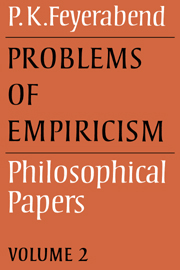Book contents
- Frontmatter
- Contents
- Introduction to volumes 1 and 2
- 1 Historical background
- 2 Classical empiricism
- 3 The structure of science
- 4 Two models of epistemic change
- 5 Philosophy of science versus scientific practice
- 6 Mach, Einstein and the Popperians
- 7 Wittgenstein's Philosophical Investigations
- 8 Consolations for the specialist
- 9 Popper's Objective Knowledge
- 10 The methodology of scientific research programmes
- 11 More clothes from the emperor's bargain basement
- Sources
- Name Index
- Subject Index
7 - Wittgenstein's Philosophical Investigations
Published online by Cambridge University Press: 05 June 2012
- Frontmatter
- Contents
- Introduction to volumes 1 and 2
- 1 Historical background
- 2 Classical empiricism
- 3 The structure of science
- 4 Two models of epistemic change
- 5 Philosophy of science versus scientific practice
- 6 Mach, Einstein and the Popperians
- 7 Wittgenstein's Philosophical Investigations
- 8 Consolations for the specialist
- 9 Popper's Objective Knowledge
- 10 The methodology of scientific research programmes
- 11 More clothes from the emperor's bargain basement
- Sources
- Name Index
- Subject Index
Summary
In discussing this book I shall proceed in the following way: I shall first state a philosophical theory T, which is attacked throughout the book. In doing so I shall not use the usual statement of the theory (if there is any) but Wittgenstein's, which may, of course, be an idealization. Secondly, I shall show how the theory is criticized by Wittgenstein: first, using an example (which plays a considerable role in his arguments, but which I have used to present other arguments as well), then discussing in general terms the difficulties revealed by the example. Thirdly, I shall state what seems to be Wittgenstein's own position on the issue. This position will be formulated as a philosophical theory, T, without implying that Wittgenstein intended to develop a philosophical theory (he did not). Finally I shall discuss the relation between the theory stated and Wittgenstein's views on philosophy and I shall end up with a few critical remarks.
For brevity's sake I shall introduce three different types of quotation marks: The usual quotation marks (“…’) enclosing Wittgenstein's own words, daggers (†…†) enclosing further developments of his ideas and general remarks, asterisks (*…*), enclosing critical remarks. Text without any of these quotation marks is an abbreviated statement of what Wittgenstein is saying.
1. †The theory criticized is closely related to medieval realism (about universals) and to what has recently been termed “essentialism”. As presented by Wittgenstein, it includes the following five main items.
- Type
- Chapter
- Information
- Problems of EmpiricismPhilosophical Papers, pp. 99 - 130Publisher: Cambridge University PressPrint publication year: 1981
- 1
- Cited by

